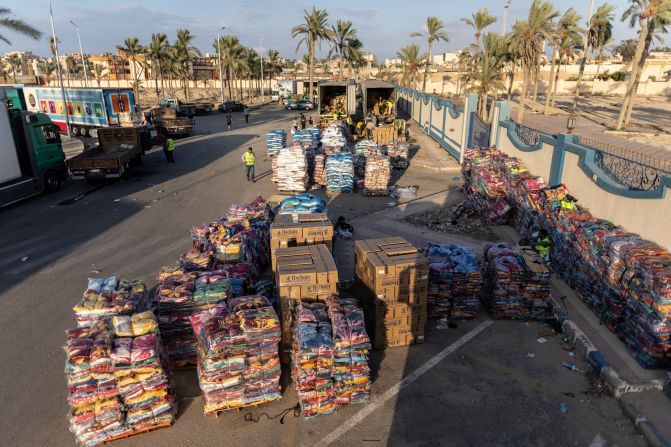International Condemnation Of Israeli Aid Ban In Gaza Intensifies

Table of Contents
Mounting International Criticism and Diplomatic Pressure
The Israeli aid ban has drawn sharp criticism and triggered intense diplomatic efforts from key global players. The strength and consistency of the condemnations underscore the severity of the situation and the urgency for a resolution.
Statements from Key International Actors
-
United Nations: The UN has repeatedly condemned the Israeli aid ban, citing its devastating impact on the civilian population. Statements from UN Secretary-General António Guterres have consistently called for an immediate reversal of the policy and emphasized the necessity of unhindered humanitarian access. Resolutions urging Israel to comply with international humanitarian law and alleviate the suffering in Gaza have been introduced in the UN Security Council.
-
European Union: The EU has issued strong statements criticizing the Israeli policy, highlighting its violation of international humanitarian law and its negative consequences for the humanitarian situation in Gaza. The EU has also pledged continued financial support to humanitarian organizations working in Gaza, despite the challenges imposed by the restrictions.
-
United States: While the US stance has been nuanced, expressions of concern from high-level officials have highlighted the need for maintaining humanitarian access to Gaza. The US has also emphasized the importance of addressing the underlying causes of the humanitarian crisis.
-
Other International Organizations: Numerous international organizations, including Amnesty International, Human Rights Watch, and Doctors Without Borders, have joined the chorus of condemnation, urging Israel to lift the restrictions immediately. Their statements cite the devastating impacts on essential services and the well-being of the Gazan population.
Human Rights Organizations' Concerns
Human rights organizations have documented alarming violations potentially aggravated by the Israeli aid ban on Gaza aid. These organizations highlight the following critical concerns:
-
Restrictions on access to essential medicines and medical supplies: This leads to preventable deaths and suffering, especially among vulnerable populations. Reports detail shortages of critical medications for chronic illnesses and difficulties in transporting patients needing specialized care.
-
Disruptions to food supplies and increased malnutrition: The aid ban hampers the delivery of food assistance, potentially leading to widespread malnutrition, particularly among children and the elderly. Reports indicate rising rates of malnutrition and food insecurity among the population.
-
Limitations on access to clean water and sanitation: This heightens the risk of disease outbreaks. The already strained water and sanitation infrastructure in Gaza is further burdened, creating an environment conducive to the spread of waterborne diseases.
-
Increased vulnerability of marginalized groups: The aid ban disproportionately affects already vulnerable populations such as women, children, the disabled, and refugees, exacerbating existing inequalities.
Impact of the Aid Ban on the Humanitarian Situation in Gaza
The Israeli aid ban has severely worsened the pre-existing humanitarian crisis in Gaza. The restrictions have had a cascading effect, impacting numerous aspects of daily life.
Food Security and Shortages
The flow of food aid has been significantly curtailed, resulting in widespread food shortages and increased malnutrition. The UN has warned of a potential famine, with reports indicating a sharp increase in food insecurity and malnutrition rates, especially among children. Gaza's already fragile infrastructure, including its limited storage facilities and transportation networks, further compounds these challenges.
Medical Care and Access to Essential Supplies
The restrictions on aid have crippled the healthcare system in Gaza. Hospitals face severe shortages of essential medicines, equipment, and medical supplies. This has led to a rise in preventable deaths and a decline in the quality of medical care. The lack of resources for treating chronic diseases and handling emergencies is particularly concerning.
Water and Sanitation Challenges
The aid ban has severely impacted access to clean water and sanitation. The already precarious water and sanitation infrastructure in Gaza is further strained, leading to a higher risk of waterborne diseases and hygiene-related illnesses. Reports highlight the potential for widespread outbreaks of waterborne diseases due to limited access to clean water and sanitation facilities.
Potential Long-Term Consequences and Global Implications
The Israeli aid ban has profound implications that extend far beyond the immediate humanitarian crisis.
Regional Instability and Escalation of Conflict
The aid restrictions could trigger further regional instability and possibly escalate the existing conflict. The worsening humanitarian situation increases the potential for unrest and violence, providing fertile ground for extremist groups to gain influence and further destabilize the region.
Damage to International Relations and Reputation
Israel's actions have caused significant damage to its international standing and relationships with other countries. The global condemnation underscores the seriousness of the situation and the potential for long-term damage to Israel's reputation and its relationships with key international partners. Continued disregard for international humanitarian law could lead to increased isolation and hinder international cooperation in other areas.
Conclusion
The international condemnation of Israel's aid ban in Gaza is intensifying, reflecting the acutely worsening humanitarian crisis. The strong global response underscores the urgency and severity of the situation. The consequences of this policy extend beyond immediate human suffering, posing significant risks to regional stability and international relations. The international community must maintain sustained pressure on Israel to lift the aid ban and ensure the unimpeded flow of humanitarian assistance to Gaza. Only through unwavering international pressure and a steadfast commitment to human rights can we hope to alleviate the suffering and prevent a further escalation of this devastating Israeli aid ban and its consequences.

Featured Posts
-
 Fox News Faces Defamation Lawsuit From Ray Epps Over January 6th Reporting
Apr 29, 2025
Fox News Faces Defamation Lawsuit From Ray Epps Over January 6th Reporting
Apr 29, 2025 -
 Global Competition Heats Up The Race To Attract Us Researchers Post Funding Cuts
Apr 29, 2025
Global Competition Heats Up The Race To Attract Us Researchers Post Funding Cuts
Apr 29, 2025 -
 Ryan Reynolds Joins Wrexhams Promotion Celebration
Apr 29, 2025
Ryan Reynolds Joins Wrexhams Promotion Celebration
Apr 29, 2025 -
 Addressing Stock Market Valuation Anxiety Insights From Bof A
Apr 29, 2025
Addressing Stock Market Valuation Anxiety Insights From Bof A
Apr 29, 2025 -
 Higher Prices And Empty Shelves The Economic Consequences Of Trumps China Tariffs On American Consumers
Apr 29, 2025
Higher Prices And Empty Shelves The Economic Consequences Of Trumps China Tariffs On American Consumers
Apr 29, 2025
Latest Posts
-
 Nine Fatalities Reported After Vehicle Strikes Crowd At Vancouvers Filipino Festival
Apr 29, 2025
Nine Fatalities Reported After Vehicle Strikes Crowd At Vancouvers Filipino Festival
Apr 29, 2025 -
 Car Plows Into Crowd At Vancouver Filipino Festival Leaving Nine Dead
Apr 29, 2025
Car Plows Into Crowd At Vancouver Filipino Festival Leaving Nine Dead
Apr 29, 2025 -
 Vancouver Filipino Festival Tragedy Nine Dead After Car Incident
Apr 29, 2025
Vancouver Filipino Festival Tragedy Nine Dead After Car Incident
Apr 29, 2025 -
 Ohio Doctors Murder Conviction Sons Emotional Journey Before Parole Decision
Apr 29, 2025
Ohio Doctors Murder Conviction Sons Emotional Journey Before Parole Decision
Apr 29, 2025 -
 Parole Hearing Looms For Ohio Doctor Convicted Of Killing Wife 36 Years Ago
Apr 29, 2025
Parole Hearing Looms For Ohio Doctor Convicted Of Killing Wife 36 Years Ago
Apr 29, 2025
